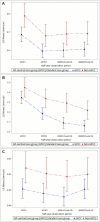Enhanced crisis resilience of general practitioner-centred care: a retrospective cohort study of patients with coronary artery disease during the COVID-19 pandemic in Germany
- PMID: 40660135
- PMCID: PMC12257840
- DOI: 10.1186/s12875-025-02917-8
Enhanced crisis resilience of general practitioner-centred care: a retrospective cohort study of patients with coronary artery disease during the COVID-19 pandemic in Germany
Abstract
Background: Structured, comprehensive provision of primary care services has been shown to provide better outcomes in chronic disease management. In 2004, Germany introduced a programme of general practitioner (GP)-centred healthcare to strengthen the primary care sector. Crises such as pandemics, world conflict and climate events can result in significant challenges for the provision of routine healthcare requiring rapid reorganisation of existing models of care provision. The objective of this study was to assess the impact of the COVID-19 pandemic on the provision of chronic disease surveillance services and the treatment of patients with coronary artery disease (CAD) by GPs in the federal state of Baden-Württemberg, Germany over the years 2019-2020 to examine if the previously demonstrated benefits of GPCC participation were maintained throughout the COVID-19 pandemic.
Methods: Retrospective cohort study monitoring 170,466 CAD patients, conducted using biannually aggregated German insurance claims data (AOK-BaWü), comparing 2019 (pre-pandemic) with 2020 (COVID-19 pandemic), examining access (contacts), therapy (e.g. statin therapy), and clinical outcomes (acute myocardial infarction, angina pectoris, stroke, invasive procedures and pacemaker/defibrillator).
Results: Patients enrolled in the GP-centred care programme (GPCC) had more frequent cohort-specific contacts, increasing during the pandemic, compared to those receiving standard care. Statin prescriptions were higher in the GPCC group and appear to be maintained over the study period. GPCC participation has demonstrated lower risks of all listed clinical outcomes in comparison to standard care and these established advantages of GPCC participation with respect to clinical outcomes were maintained during 2020 despite the challenges of the COVID-19 pandemic.
Conclusion: Structured, comprehensive GP-centred care in Germany demonstrated resilience the challenges of the COVID-19 pandemic and was associated with better continuity of care for patients with coronary artery disease (CAD) and a maintained lower risk of CAD complications. These differences could be explained by the structured and comprehensive provision of primary care services and enhanced coordination with secondary care, allowing practices to maintain care effectively despite the challenges of the COVID-19 pandemic.
Keywords: COVID-19 pandemic; Chronic disease; Continuity of patient care; Coronary artery disease; Primary health care.
© 2025. The Author(s).
Conflict of interest statement
Declarations. Ethics approval and consent to participate: This study was submitted to the Ethics Committee of the Faculty of Medicine at the Goethe University, Frankfurt am Main under the reference number 470/13. The waiver is based on the principles outlined in the Declaration of Helsinki and the German Professional Code for Physicians (§ 15). According to the ethics committee, an approval is not required for studies that exclusively rely on fully anonymized secondary data from health insurance records. As this study does not involve direct patient contact or identifiable personal data, the Ethics Committee of the Faculty of Medicine at the Goethe University, Frankfurt am Main determined that a formal ethics vote is unnecessary and that consent to participate is not applicable in this case. Consent for publication: Not applicable. Competing interests: The authors declare no competing interests.
Figures



Similar articles
-
Continuity of care in a pandemic: an observational study in GP-centred healthcare in Germany.BMJ Open Qual. 2025 Mar 3;14(1):e002944. doi: 10.1136/bmjoq-2024-002944. BMJ Open Qual. 2025. PMID: 40032595 Free PMC article.
-
Effects of city design on transport mode choice and exposure to health risks during and after a crisis: a retrospective observational analysis.Lancet Planet Health. 2025 Jun;9(6):e467-e479. doi: 10.1016/S2542-5196(25)00088-9. Lancet Planet Health. 2025. PMID: 40516538
-
Service Interruption in HIV Care Amid COVID-19 Pandemic in Myanmar: Results From Analysis of Routine Program Data 2018-2022.J Int Assoc Provid AIDS Care. 2024 Jan-Dec;23:23259582241299466. doi: 10.1177/23259582241299466. J Int Assoc Provid AIDS Care. 2024. PMID: 39648608 Free PMC article.
-
Antibody tests for identification of current and past infection with SARS-CoV-2.Cochrane Database Syst Rev. 2022 Nov 17;11(11):CD013652. doi: 10.1002/14651858.CD013652.pub2. Cochrane Database Syst Rev. 2022. PMID: 36394900 Free PMC article.
-
Measures implemented in the school setting to contain the COVID-19 pandemic.Cochrane Database Syst Rev. 2022 Jan 17;1(1):CD015029. doi: 10.1002/14651858.CD015029. Cochrane Database Syst Rev. 2022. Update in: Cochrane Database Syst Rev. 2024 May 2;5:CD015029. doi: 10.1002/14651858.CD015029.pub2. PMID: 35037252 Free PMC article. Updated.
References
-
- World Health Organization. Regional Office for Europe. COVID-19 and the disruption of noncommunicable diseases services: snapshot of survey results for the European Region, WHO.: 2020 CC BY-NC-SA 3.0 IGO [Stand: 18.03.2025]. Verfügbar unter: https://iris.who.int/bitstream/handle/10665/337813/WHO-EURO-2020-1721-41...
MeSH terms
LinkOut - more resources
Full Text Sources
Medical
Miscellaneous
